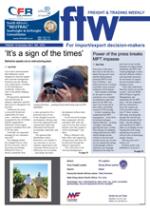Last week’s announcement
that Safmarine would
integrate its internal support
and corporate management
functions into the Maersk
Line organisation, resulting
in 240 redundancies
worldwide, reflects the
state of the global shipping
industry.
Driving down operational
costs has become an
industry imperative and this
latest move is designed to do
just that.
“Safmarine has been
a successful brand and
organisation for many
years – and that is clearly
recognised by the AP Moller
Maersk organisation,”
Safmarine Africa region
executive Jonathan Horn told
FTW last week.
“And that’s an important
message for our customers
and staff.”
The shipping market
has changed forever since
the last recession, and it’s
becoming increasingly
difficult for lines to
attract a premium from
a rates perspective for a
premium-type service.
In the changed economic
environment, driving costs
out of the organisation and
continuously improving
efficiencies has become
increasingly important, said
Horn.
The question that
shareholders asked
themselves was whether it
was necessary to run two
separate organisations and
corporate infrastructures to
effectively run two brands
– and clearly the latest
development reflects their
thinking.
“In the structural change
that is proposed, who the
customers deal with, the
type of service they receive
and the voice they speak to
will be unchanged,” said
Horn.
What is affected is the
back office and supporting
infrastructure that that will
be delivered through the
Maersk organisation.
“The work done in the
Antwerp headquarters, which includes the
functional and trades
organisations and regional
offices will be delivered by a
Safmarine CEO and his/her
team based in Copenhagen,
leveraging the Maersk Line
corporate infrastructure.
The CFO will be appointed
in the next few weeks,” he
added.
“The Safmarine CEO
and supporting team will be
responsible for making sure
the brand continues to evolve
and our differentiation
continues to be felt,” he said.
Maersk announced last
week that current Safmarine
CEO Tomas Dyrbye would
be leaving the position. The
changed nature and scope of
the CEO role was the prime
reason for his not wanting to
continue in the position.
While the press statement
revealed that Safmarine’s
Antwerp head office and
regional offices in Antwerp,
Shanghai, Dubai, Cape
Town and Mumbai would
all be closed, there is still
no clarity on names and
numbers of people affected
in the local operation.
“At this point the
consultation process has just
begun,” said Horn. “Every
effort will be made to
accommodate the many good
people that are affected,
but there are likely to be
redundancies.
While the company works
through its consultation
process, the important focus
right now is on employees –
especially those impacted by
the move – and customers,
said Horn.
In terms of vessel
ownership, while the
management of container
vessels and operations
around that are already
integrated into Maersk, the
Multi-Purpose Vessel (MPV)
business of Safmarine will
be unaffected.
Safmarine’s geographic
focus is also unlikely to
change. “Our core regions
will continue to be Africa,
the Middle East and
India. We believe that our
operating model works well
in emerging economies.”
And while Horn’s role is
among those that have been
made redundant, he stressed
that the consultation process
had just begun and that
there was no clarity at this
stage on who would go and
who would remain in the
organisation.
“We’ll have to see
what will unfold, but the
company will do its best to
accommodate those who
have been impacted.”
While it won’t be business
as usual, Horn stressed that
the company would do all it
could to minimise impact in
this period of transition for
customers and staff.
It’s a sign of the times’
14 Oct 2011 - by Joy Orlek
0 Comments
FTW - 14 Oct 11

14 Oct 2011
14 Oct 2011
14 Oct 2011
14 Oct 2011
14 Oct 2011
14 Oct 2011
14 Oct 2011
14 Oct 2011
Border Beat
17 Jun 2025
30 May 2025
Poll
Featured Jobs
New
New
